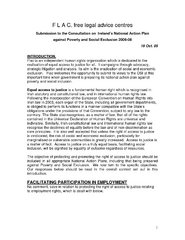Submission to the Consultation on Ireland's National Action Plan against Poverty and Social Exclusion 2006-08

Download
Summary
Equal access to justice is a fundamental human right which is recognised in Irish statutory and constitutional law, and in international human rights law. Following the incorporation of the European Convention on Human Rights into Irish law in 2003, each organ of the State, including all government departments, is obliged to perform its functions in a manner compatible with the State's obligations under the provisions of that Convention, subject to any law to the contrary. The State also recognises, as a matter of law, that all of the rights contained in the Universal Declaration of Human Rights are universal and indivisible. Similarly, Irish constitutional law and international human rights law recognise the doctrines of equality before the law and of non-discrimination as core principles.
It is also well accepted that unless the right of access to justice is vindicated, the risk of social and economic exclusion, particularly for marginalised or vulnerable communities is greatly increased. Access to justice is a matter of fact. Access to justice on a truly equal basis, facilitating social inclusion, will be signified by equality of outcome regardless of resources.